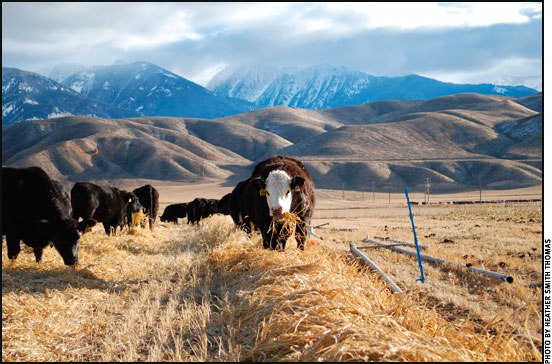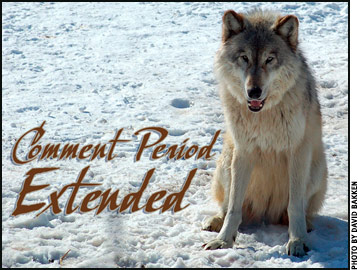
Summer Annuals Extend Fall Grazing
Researchers evaluate warm-season annuals for fall and winter grazing.
Extending the grazing season can help reduce production costs. In dry climates ranchers often run short of fall pasture, especially when productivity of cool-season perennial grasses is limited during the heat of summer. In 2008, researchers at the University of Idaho's Nancy Cummings Research, Extension and Education Center, Salmon, Idaho, began looking at ways to extend grazing with summer annuals.
John Hall, extension beef specialist, worked with test plots for three years. When irrigation was available during the 60-day growing season, some species produced 2 to 3 tons per acre. Part of the plot was given only a month of irrigation, with water turned off Aug. 1 to simulate what happens on many ranches. Read more.

Hope for Agriculture in Advocacy
Speaker encourages cattlemen to put themselves in a position to be recognized as the experts they are in issues related to animal care, environment.
"Rural America is being protected to death," said Bruce Vincent, co-owner of Environomics and third-generation logger. The keynote speaker for the National Angus Conference and Tour (NAC&T) outlined some of the challenges activists pose to farmers and ranchers and offered some suggestions to provide hope for American agriculture and rural culture.
Americans are having a collision of visions, Vincent said. Urban Americans want to protect rural areas without understanding the rural culture and how their actions affect rural Americans. Vincent compared what animal agriculture is facing now to what the logging industry experienced years ago. Urban Americans want to protect the environment, and they want to protect animals, but they don't understand the stewardship that goes into both industries.
"We need a new environmental vision in our nation, and it needs to be built on hope instead of fear, science instead of emotion, education instead of litigation, resolution instead of conflict, and employing rather than destroying human resources," he said. "The new movement is going to be led by rural people because we live too close to the ground to pretend." Read more.

Wes Tiemann
Association Perspective
The gold standard
For the sake of staying out of political trouble, I will cut right to the chase in regard to current monetary issues. Investors are flat scared and confused about the direction of the economy. The attempts to correct these conditions from our friendly "Big Brother" seem only to make things worse. As history shows, tangibles become increasingly enticing as investments when there is unrest in the dollar. As gold breaks new records every week, I assume that there is little faith in our dollar and less faith in policy direction to correct our recession.
As a rule, we know smart investors diversify. So what's more attractive than gold? Black gold! Yes, that's right, I am talking about oil, but more importantly I am talking about black dirt and black cows. Read more.
Consumers Say U.S. Farmers Not Responsible for Feeding the World
Research seeks to find what will be required for consumers to support today's farming practices.
A new study indicates that a large segment of consumers do not believe U.S. farmers should be responsible for addressing global hunger. In its latest analysis of consumer trust in the food system, the Center for Food Integrity (CFI) found that 40% of those surveyed strongly disagreed that, "the United States has a responsibility to provide food for the rest of the world."
The study also shows that more than half the survey participants strongly agreed with the statement, "It is more important for the U.S. to teach developing nations how to feed themselves than to export food to them." Read more.
FWS reopened the comment period regarding revising the list of endangered and threatened wildlife for the gray wolf in the Eastern United States. Comments will be accepted through Sept. 26.
The U.S. Fish and Wildlife Service (FWS) reopened the comment period on the May 5 proposed rule to delist the gray wolf population in the Western Great Lakes and revise the listing to remove all or parts of 29 eastern states where the listed species did not historically occur. The action will allow for additional public review and the inclusion of any new information. Comments will be accepted through Sept. 26.
Gray wolves were originally listed as subspecies or as regional populations of subspecies in the lower 48 states and Mexico under the Endangered Species Act (ESA) and its predecessor statutes. In 1978, the FWS reclassified the gray wolf as an endangered species across all of the lower 48 states and Mexico, except in Minnesota where the gray wolf was classified as threatened. Read more.
What’s Inside …
In this September edition of the Angus Beef Bulletin EXTRA, you'll find valuable articles devoted to the management, marketing, and health and nutrition of your beef enterprise. Select from the tabs at the top of the page to access this month's entire offering by category. A few select features include:
- Buy By the Pound and Other Tips
- Cow Camp Chatter: Replacement rate
- Beef Talk: Resilience vs. resistance
- Gestation Intervals Shorter in Heat
- Consider Turnout Date Before Applying Pyrethroids
- Baseline Updated
- Feeding Quality Forum Highlights: Roll With the Punches
News Briefs …
The American Angus Association and its subsidiaries generate a wealth of information to keep members and affiliates informed of what's happening within the industry as well as with the programs and services they offer. Click here for easy access to the newsrooms of the American Angus Association and Certified Angus Beef LLC and the Angus e-List archive.
College Credits
Remember tax tips when paying college expenses.
Most students have arrived on campus, unpacked their belongings, shopped for books and supplies, and attended their first classes for the fall semester. Soon, payments will be due on university bills. Mary Beth Kaufman, a family finance program specialist with Iowa State University (ISU) Extension and Outreach, reminds students and parents paying college expenses to keep receipts and be aware of tax benefits that can help offset college costs. Read more.
Impressionable
Parents' stress leaves mark on DNA of children.
Parents who are stressed during their children's early years can leave an imprint on their sons' or daughters' genes — an imprint that lasts into adolescence and may affect how these genes are expressed later in life, according to a study by researchers at the University of Wisconsin (UW) and the University of British Columbia.
The study, published Aug. 30 in the journal Child Development, focused on epigenetics — the expression of genes, as opposed to the underlying sequence of DNA. A central component of epigenetics is methylation, in which a chemical group attaches to parts of the DNA — a process that acts like a dimmer on gene function in response to social and physical environments. Read more.
[Click here to go to the top of the page.]













